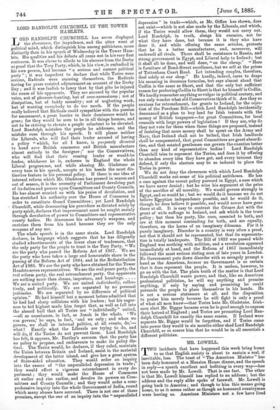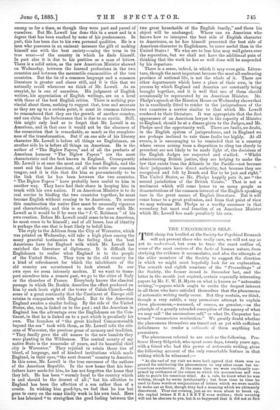MB. LOWELL. T WO incidents that have happened this week bring
home to us that English society is about to sustain a real, if inevitable, loss. The toast of "The American Minister" has been duly honoured at a Mansion House dinner, and the speech in reply—a speech excellent and befitting in every way—has not been made by Mr. Lowell. That is one fact. The other is that Mr. Lowell himself has replied to an address; but the address and the reply alike spoke of farewell. Mr. Lowell is going back to America ; and though to him this means going home, to us it seems rather as though an honoured countryman were leaving us. American Ministers not a few have lived
among us for a time, as though they were part and parcel of ourselves. But Mr. Lowell has done this in a sense and in a degree that has been reached by none of his predecessors. In part, this has been due to his own personal qualities. He is a man who possesses in an eminent measure the gift of making himself one with the best society—using the term in its true sense—of the country in which he finds himself. In part also it is due to his position as a man of letters. There is a solid union, as the new American Minister showed on Wednesday, between the learned professions in the two countries and between the mercantile communities of the two countries. But the tie of a common language and a common literature is greater and closer still, and it is this that we naturally recall whenever we think of Mr. Lowell. As an essayist, he is one of ourselves. His judgment of English writers, his appreciation of English writings, are on a level with those of the best English critics. There is nothing provincial about them, nothing to suggest that, true and accurate as they are up to a certain point, it must in common fairness be remembered that they are the growth of another country, and can claim the forbearance that is due to an exotic. Still, this might only lead us to forget that Mr. Lowell is an American, and in that case it would not be the closeness of the connection that is remarkable, so much as the completeness of the transformation. But if on one side of his literary character Mr. Lowell is before all things an Englishman, on another side he is before all things an American. He is the author of "The Biglow Papers," and of all the products of American humour "The Biglow Papers" are the most characteristic and the best known in England. Consequently Mr. Lowell is at once the most and the least English, and the most and the least American, of all who write our common tongue, and it is this that fits him so pre-eminently to be the link that he has been between the two countries. "The Biglow Papers" have probably been useful to him in another way. They have had their share in keeping him in touch with his own nation. If an American Minister is to do real service in binding the two countries together, he must become English without ceasing to be American. To secure this combination the native fibre must be unusually vigorous and characteristic, and this is as much the case with Mr. Lowell as it would be if he were the "J. a Robinson" of his own creation. Before Mr. Lowell could cease to be an American, he must cease to be himself ; and of all losses, loss of identity is perhaps the one that is least likely to befall him.
The reply to the Address from the City of Worcester, which was printed on Wednesday, will take a high place among the many graceful testimonies to the feeling that the best Americans have for England with which Mr. Lowell has enriched the literature of diplomacy. It is difficult for Englishmen to realise what England is to the people of the United States. They turn to the old country for a kind of refreshment for which the inhabitants of the old country are accustomed to look abroad. In our own eyes we seem intensely modern. If we want to trans port ourselves into a remote past, we go to the cities of Italy or the churches of France. Everybody knows the classical passage in which Mr. Ruskin describes the effect produced on him by each fresh sight of the tower of Calais Church—the sense of a great continuity that the Continent of Europe still retains in comparisen with England. But to the American England awakes a similar feeling. By the side of the United States, she, too, is linked on to the past ; and the American in England has the advantage over the Englishman on the Con tinent, in that he is linked on to a past which is peculiarly his own. The founders of "the great kindred Commonwealth beyond the sea" took with them, as Mr. Lowell tells the citi zens of Worcester, the precious gems of memory and tradition.
"They fondly gave the old names to the new hamlets they were planting in the Wilderness. The central county of my native State is the namesake of yours, and its beautiful chief city is Worcester." They rejoiced to retain those ties of blood, of language, and of kindred institutions which made England, in their eyes, "the next dearest" country to America.
In this sense, Mr. Lowell is the true successor of the authors of the American Republic. In the new home that his fore
fathers have made for him, he has not forgotten the home that
they left. He has been "warmly loyal to the country which is and should be the dearest of all ;" but his affection to England has been the affection of a son rather than of a cousin. In wishing him good-bye, we feel that he has but gone to carry on the same kindly work in his own land. Here he has laboured "to strengthen the good feeling between the two great households of the English family," and there his object will be unchanged. Where can an American who knows how to interpret the best side of English character to Americans, as he has himself presented the best side of American character to Englishmen, be more useful than in the United States ? We who are to lose him may well grieve over the separation, but we shall not have the additional pain of thinking that the work he has so well done will be suspended by his departure.
There is a sense, indeed, in which it may even gain. Literature, though the most important because the most all-embracing province of national life, is not the whole of it. There are other departments which have a place of their own, in the process by which England and America are constantly being brought together, and it is well that one of them should occasionally be represented by an American Minister. Mr. Phelps's speech at the Mansion House on Wednesday shows that he is excellently fitted to render to the jurisprudence of the two countries a service similar to that which Mr. Lowell rendered to their literature. It was appropriate that the first appearance of an American lawyer in the capacity of Minister to England, should be at a dinner given to the Judges, and Mr. Phelps used the opportunity well. There are faults, no doubt, in the English system of jurisprudence, and in England we are perhaps inclined to rate these faults too highly. At all events, it is encouraging to be reminded that in a country where errors arising from a disposition to cling too closely to precedent are not likely to be made light of, the decisions of the English Judges are respected and studied. "Whilst administering British justice, they are helping to make the law that exists from the Atlantic to the Pacific—not because their judgments have direct authority, but because they are recognised and felt by Bench and Bar to be just and right." The United States, as Mr. Phelps happily puts it, are "the second jurisdiction of the British Courts." That is not a sentiment which will come home to as many people as demonstrations of the common interest of the English-speaking, race in the great names of English literature. But it will come home to a great profession, and from that point of view we may welcome Mr. Phelps as a worthy successor in that secondary but most real function of an American Minister which Mr. Lowell has made peculiarly his own.



































 Previous page
Previous page